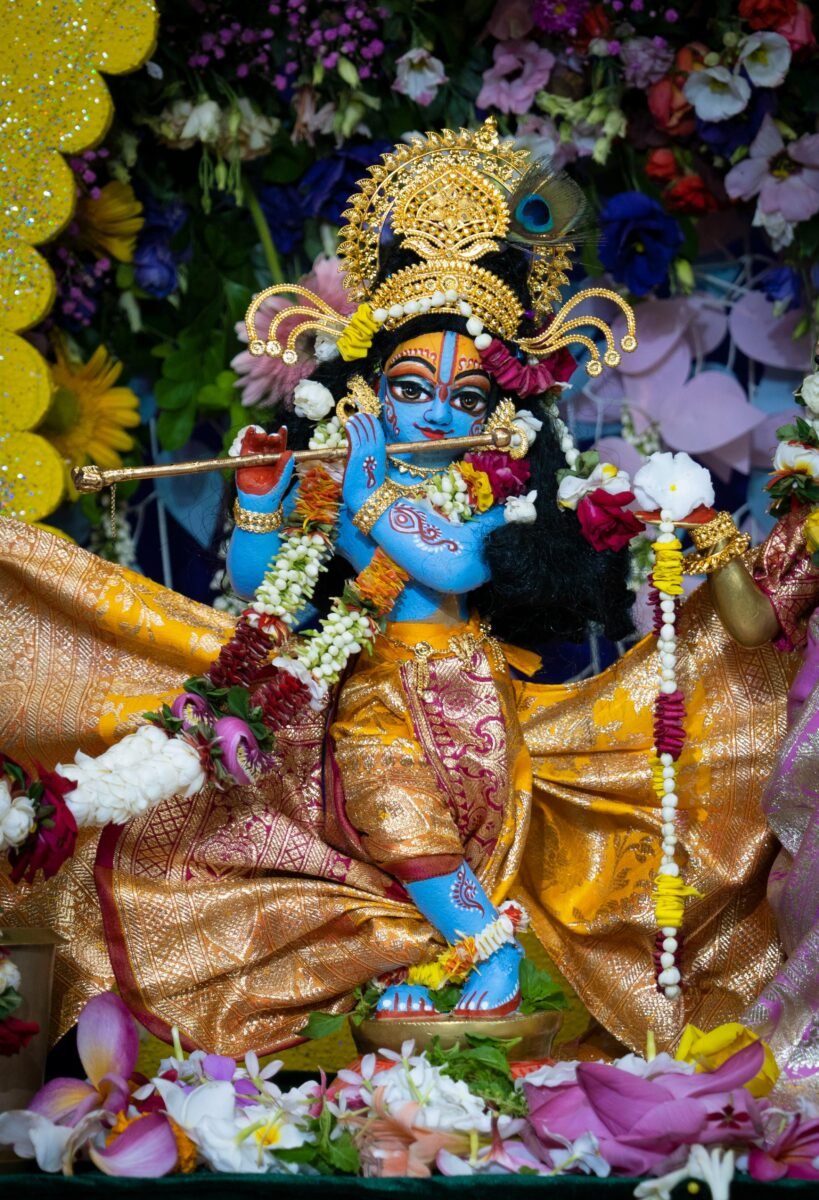
The Path of Devotion and Power: Life Insights from the Glory of Lord Hanuman
June 29, 2025
Your Hands, Your Story: Exploring the Power of Palm Reading
July 13, 2025In a world where choices abound and the weight of responsibility often feels heavy, finding clarity amidst the chaos can seem like an insurmountable challenge. Yet, ancient wisdom has much to offer in our modern lives. Enter Lord Krishna, the divine guide who transcends time and space. Introduction: The concept of Karma and its significance in Hinduism

Karma is more than just a buzzword in the spiritual realm; it holds profound significance in Hinduism. It represents the intricate web of actions, intentions, and their consequences that shape our lives. Each thought and choice we make sends ripples through time, influencing not only our present but also our future.
At the heart of this concept lies Lord Krishna, who offers invaluable wisdom on navigating the complexities of Karma. His teachings provide clarity and guidance for those seeking to align their duties with their destinies. In a world filled with uncertainty, understanding how to manage Karma can empower us to lead more meaningful lives.
Join us as we explore the essence of Karma through Lord Krishna‘s perspective—uncovering insights that can transform duty into destiny while illuminating your unique path forward.
What is Karma according to Lord Krishna?
Karma, as explained by Lord Krishna, is the law of cause and effect that governs human actions. It reflects the belief that every deed—good or bad—creates a ripple in the universe. Each action shapes our present and influences our future.
Lord Krishna emphasizes that karma isn’t just about immediate results; it’s a continuum. He teaches us to act selflessly without attachment to outcomes. This principle allows individuals to fulfill their duties while remaining spiritually anchored.
Through his teachings in the Bhagavad Gita, Krishna illustrates how intentions matter more than results. By focusing on righteous actions (dharma), one can cultivate positive karma and advance on their spiritual journey.
Understanding this concept helps devotees navigate life’s challenges with grace. It encourages them to make conscious choices aligned with moral values rather than succumbing to desires or fears.
The three types of Karma explained by Lord Krishna
Lord Krishna delineates three primary types of Karma: Sanchita, Prarabdha, and Kriyaman. Each plays a distinct role in shaping our spiritual journey.
Sanchita Karma refers to the accumulated actions from past lives. It is like a reservoir of experiences that we carry with us. This reservoir influences our current circumstances and challenges.
Prarabdha Karma is what we face in this lifetime. It includes those fruits of previous actions that have begun to manifest. These are the situations we must navigate now, as they form part of our destiny.
Kriyaman Karma involves our present actions—what we decide today shapes tomorrow’s reality. Every choice matters here; it can either reinforce old patterns or pave new paths toward growth and enlightenment.
Understanding these categories helps one gain clarity on their life’s purpose while navigating the complexities of existence under Lord Krishna’s teachings.
How to break the cycle of Karma according to Lord Krishna
Breaking the cycle of Karma requires a deep understanding of one’s actions and their consequences. Lord Krishna emphasizes self-awareness in our daily choices.
He teaches that performing duty without attachment is vital. When we act with pure intentions, we can transcend negative cycles. It’s not just about action; it’s about intention behind those actions.
Meditation plays a crucial role as well. By turning inward, individuals can cultivate clarity and discernment. This inner peace allows for better decision-making.
Krishna also encourages surrendering to divine will. Trusting in his guidance helps us navigate challenges effortlessly. The more we embrace faith, the lighter our burdens become.
Lastly, practicing compassion towards others creates positive vibrations around us. Acts of kindness generate good Karma, fostering an environment where negativity diminishes naturally while growth flourishes.
Understanding the role of Dharma in managing Karma
Dharma plays a pivotal role in how we navigate our karma. It represents the moral and ethical duties that guide us through life. When we align ourselves with dharma, we act in ways that promote harmony and balance.
Each action taken in accordance with dharma contributes positively to our karmic footprint. This alignment helps us make choices that resonate not only with our inner values but also with the greater good of society.
Moreover, understanding one’s personal dharma can clarify complex situations. It provides clarity on what is right versus wrong, helping individuals avoid actions that lead to negative karma.
Engaging with dharma allows for growth, transformation, and ultimately liberation from cyclical patterns of suffering. By prioritizing these righteous pathways laid out by Lord Krishna’s teachings, one can seamlessly weave through life’s challenges while fostering positive karmic outcomes.
Practical tips for navigating Karma in daily life
Navigating karma in daily life requires mindfulness and intention. Start by cultivating awareness of your actions. Consider how each choice resonates with others and the environment around you.
Practice gratitude consistently. Acknowledging what you have can shift your energy positively, attracting good karma in return.
Engage in selfless acts without expecting rewards. Volunteering or helping someone in need creates a ripple effect of positivity that enhances your karmic footprint.
Reflect regularly on past actions. Learning from both successes and mistakes helps refine future decisions, aligning them more closely with dharma.
Finally, embrace forgiveness—both for yourself and others. Letting go of grudges frees up mental space for positive experiences to flourish, ultimately guiding you toward a more fulfilling path aligned with Lord Krishna’s teachings.
The power of surrendering to Lord Krishna for guidance on our path
Surrendering to Lord Krishna opens a pathway to divine guidance. It invites clarity and wisdom into our lives, especially when navigating the complexities of karma.
When we let go of control, we create space for spiritual insights. This act of surrender is not about passivity; it’s an active choice to trust in higher order and purpose.
Lord Krishna embodies unwavering love and support. By turning to Him during challenges, we gain strength from His teachings. The Bhagavad Gita emphasizes that true freedom lies in aligning with one’s dharma through this surrender.
Embracing vulnerability can be transformative. Each moment spent in devotion brings us closer to understanding our unique path while alleviating burdens that weigh heavily on the soul.
Through prayer and contemplation, one can feel Krishna’s presence guiding decisions and illuminating choices—turning confusion into clarity as life unfolds beautifully before us.
Conclusion: Embracing our duty and destiny through the teachings of Lord Krishna
Embracing our duty and destiny through the teachings of Lord Krishna invites us to explore a profound relationship between action and consequence. Lord Krishna’s insights on Karma guide us in understanding that every choice we make carries weight. The significance of our actions shapes not just our present but potentially alters our future.
As we navigate life’s complexities, the framework set by Lord Krishna allows for clarity and purpose. By recognizing the three types of Karma—Sanchita, Prarabdha, and Kriyaman—we can assess where we stand in this vast cycle of life. This awareness helps us embrace Dharma, ensuring we’re aligned with righteousness as we move forward.
The act of surrendering to Lord Krishna isn’t about relinquishing control; rather, it’s an invitation to find strength in faith. Trusting his guidance empowers us to break free from negative patterns while promoting growth toward realization and enlightenment.
In daily life, integrating these philosophies offers practical pathways to manage Karma effectively. Simple actions rooted in kindness or compassion ripple outward positively influencing both ourselves and others around us.
Ultimately, embracing duty is more than fulfilling obligations; it’s about aligning with higher principles that shape our destinies according to divine wisdom laid out by Lord Krishna. As followers embark on this journey together, they discover that navigating their own paths becomes enriching when guided by such timeless teachings.

